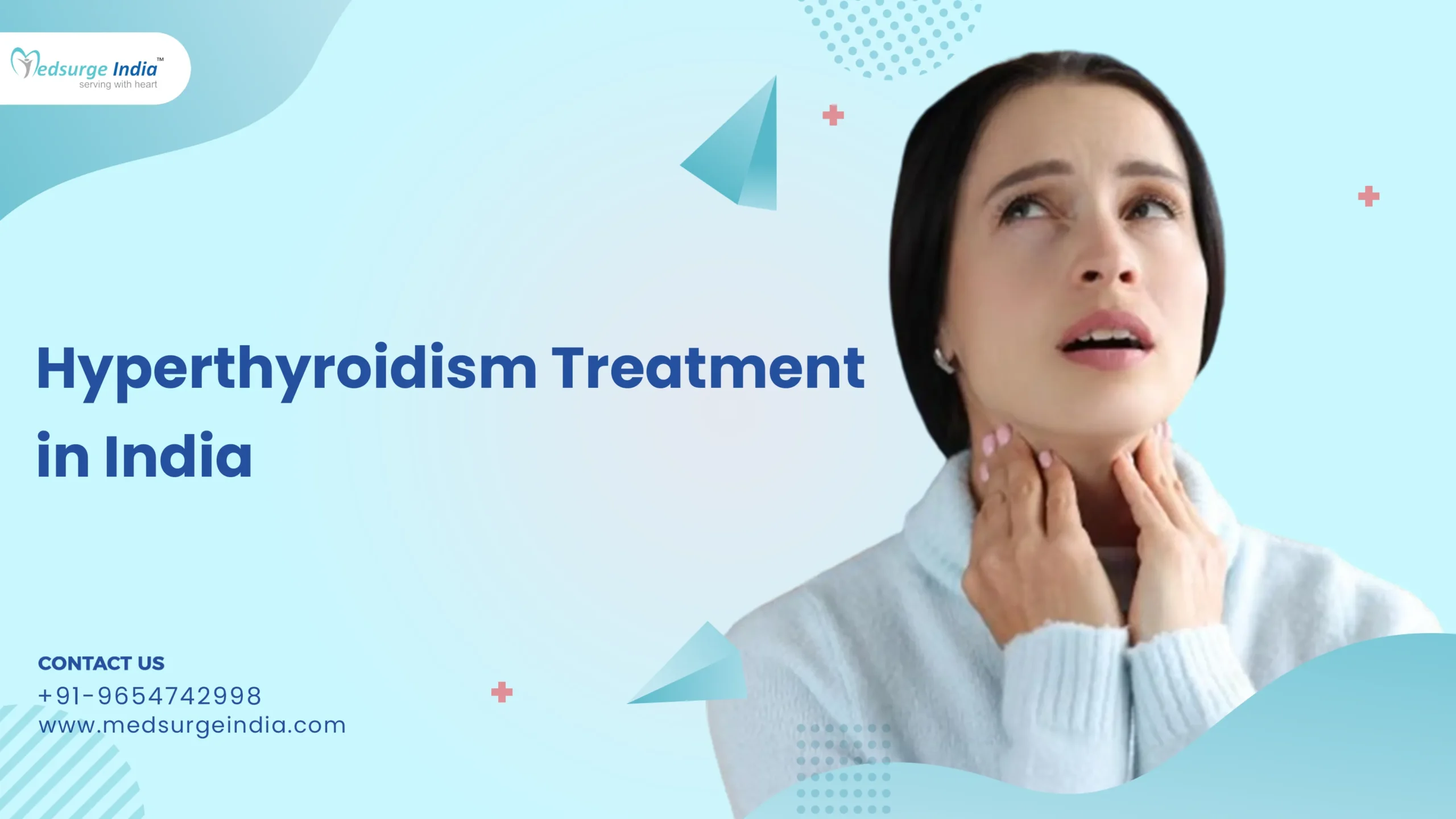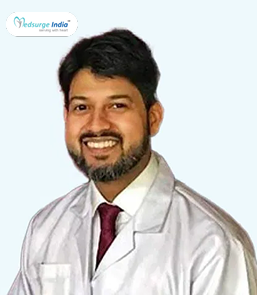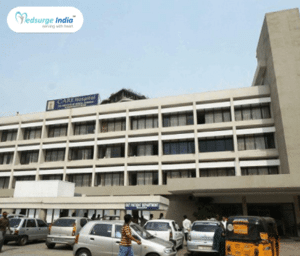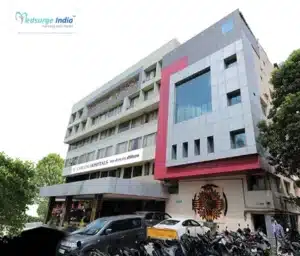Hyperthyroidism Treatment Cost in India
Unlock Exclusive Discount : Your Gateway to Premium Healthcare with Medsurge India Health Value Card.

Unlock Exclusive Discount : Your Gateway to Premium Healthcare with Medsurge India Health Value Card.


The overproduction of thyroid hormone by the thyroid gland results in hyperthyroidism. Another name for this illness is hyperactive thyroid. The body’s metabolism is accelerated by hyperthyroidism. This may result in a variety of symptoms, including rapid or irregular pulse, hand tremors, and weight loss.
There are numerous ways to treat hyperthyroidism. The thyroid gland’s hormone production can be slowed down by anti-thyroid medications and radioiodine. Surgery to remove the thyroid gland entirely or in part is sometimes used as a therapy for hyperthyroidism. Occasionally, hyperthyroidism may go better on its own without the need for medication or other treatments, depending on what’s causing it.
An average hyperthyroidism treatment Cost in India is between RS. 29,200 to 1,25,000 (350 USD to 1500 USD). This price typically includes necessary preoperative tests, the treatment itself, and consultation with the doctor. However, please note that accommodation and transfers are not included in this cost.
| Cities | Starting Price In USD |
| Delhi | 350 USD |
| Gurgaon | 350 USD |
| Noida | 300 USD |
| Mumbai | 350 USD |
| Hyderabad | 350 USD |
| Chennai | 350 USD |
| Kolkata | 350 USD |
| Bangalore | 350 USD |
Note: Keep in mind that the aforementioned cost provided is solely for the treatment. The overall cost of hyperthyroidism treatment in India will be determined based on several factors.
Various factors can affect the cost of hyperthyroidism treatment in India. Your budget is greatly impacted by numerous elements that fail under pre and post-treatment costs. Below are the various factors that can affect the cost of hyperthyroidism treatment in India.
Patients who are seeking hyperthyroidism treatment in India are offered exceptional medical services and facilities and these facilities rival those of well-known healthcare centers worldwide.
We at, Medsurge India ensure that patients will receive the most affordable hyperthyroidism treatment Cost in India and with the expertise of highly qualified doctors. Furthermore, a foreign patient can save up to 30-40% of the cost in India when compared to their native countries.
Hyperthyroidism has a wide range of symptoms that can affect every part of your body. Some of these symptoms may affect you more than others, or you may have several of them at once. Hyperthyroidism symptoms can include:
Numerous illnesses that affect the thyroid gland might result in hyperthyroidism. The thyroid is a little gland at the base of the neck that resembles a butterfly. It significantly affects the body. The thyroid gland produces all of the hormones that regulate every aspect of metabolism.
Thyroxine (T-4) and triiodothyronine (T-3) are the two primary hormones produced by the thyroid gland. All of the body’s cells are impacted by these hormones. They facilitate the body’s use of lipids and carbs at different rates. They aid in regulating body temperature. Heart rate is impacted by them. Also, they aid in regulating the body’s production of protein.
When the thyroid gland releases too many thyroid hormones into the bloodstream, the condition known as hyperthyroidism results. Hyperthyroidism can result from the following conditions:
Blood tests, physical examinations, and medical histories are used to diagnose hyperthyroidism. You could also require additional testing based on the outcomes of the blood tests.
For hyperthyroidism, there are numerous therapeutic choices. Certain choices might be more suitable for you, depending on the reason for your hyperthyroidism. Your medical professional will go over all of your options with you and assist you in choosing the best course of action.
Options for treating hyperthyroidism include:
Antithyroid medications either propylthiouracil (PTU) or methimazole (Tapazole): These medications prevent your thyroid from producing hormones. They provide quick thyroid control.
Radioactive iodine: This is an oral treatment that your hyperactive thyroid cells absorb. Over the course of a few weeks, the radioactive iodine destroys these cells, shrinking your thyroid and lowering thyroid hormone levels. Usually, this results in the thyroid being permanently destroyed, curing hyperthyroidism. The radiation dose administered by this drug differs from the dose utilized in the radioactive iodine uptake (RAIU) test and diagnostic scan. To keep their hormone levels regular for the rest of their lives, the majority of patients undergoing this procedure must take thyroid hormone medications.
Surgery: Your doctor may perform a thyroidectomy or removal of the thyroid gland. Your hyperthyroidism will be corrected, but it will typically result in hypothyroidism (an underactive thyroid), which means you’ll need thyroid supplements for the rest of your life to maintain normal hormone levels.
Beta-blockers: These medications prevent the body from responding to thyroid hormones. They don’t alter the hormone levels in your blood, but they can help control hyperthyroidism symptoms like trembling anxiety, and fast heartbeat. To treat hyperthyroidism over the long term, this medication is typically combined with another approach.
India is one of the best healthcare service providers and provides the best treatment which is on par with other top countries. These are some reasons why international patients choose India as a top destination as per their budget and treatment.
Medsurge India is a prestigious support system for patients looking for doctors, hospitals, and specialized treatments. We’ll find the most suitable medical options for you. Regarding your medical issues, our team will give you a list of certified, reputable, and trusted doctors and hospitals. Additionally, we offer a treatment strategy that fits your budget. Apart, we assist patients with obtaining travel authorizations, medical visas, and a multitude of other things.
A: Thyroiditis, toxic nodular goiter, Graves' disease, and overuse of thyroid medication can all contribute to this illness. Anxiety, impatience, excessive perspiration, and fine, brittle hair are possible symptoms. Medication, radioactive iodine, surgery, or beta-blocking medication are possible forms of treatment.
A: Yes, hyperthyroidism can be permanently treated. Hyperthyroidism can be cured by having your thyroid surgically removed or by taking medicine to destroy it. You will, however, require lifelong thyroid hormone replacement therapy if your thyroid is removed or damaged.
A: TSH levels of approximately 4.0mU/L and higher suggest hypothyroidism, whereas those below 0.4mU/L indicate hyperthyroidism.
A: While several therapies for hyperthyroidism, such as surgery, can heal the problem, they can also leave you without a thyroid that functions properly.
A: Look for changes in your appearance, such as thinning or brittle hair, dry, red, itchy, or irritated skin, swelling in your joints, a puffy face, or swelling at the base of your neck, in addition to changes in your weight.








ENT Surgeon
Head of Department - ENT
38+ Years of Experience
MASSH Super Specialty Hospital
View Doctor
ENT Surgeon
Senior Consultant
40+ years of experience
Manipal Hospital, Panaji, North Goa
View Doctor
ENT Surgeon
Senior Consultant
23+ years of experience
KMC Hospital, Hampankatta, Mangaluru
View Doctor









By using our site, you agree to our Terms and Conditions, Privacy Policy and Refund Policy. Medsurge India provides reliable healthcare information and treatment options to support informed decision-making. Our content is designed to support and complement the guidance of your treating doctor, helping you feel informed and confident throughout your healthcare journey. We also Accept International Payments.

Copyright © 2025 NSM ONLINE SOLUTIONS PRIVATE LIMITED. All rights reserved.